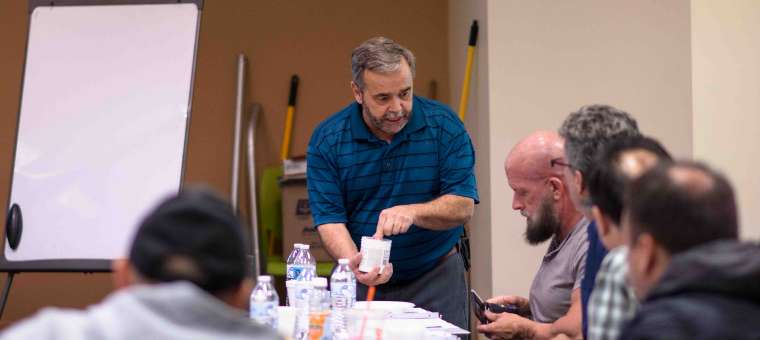Fires Out, Now What?
All sales final - returns not accepted. Read more
Product Highlights
- Jeff Bishop, author
- Proven techniques for running a fire restoration business
- Includes volumes I and II
- Vol. I covers organization and management
- Vol. II covers marketing and sales
We pay the shipping charge, including hazardous material fees, on this item. There's no catch. No "buy this to get that" requirement.
Note: If your order contains items that are not eligible for free shipping, your order total will include our competitive shipping rates for those non-eligible items only. This shipping policy only applies to orders shipped within the Contiguous U.S.
Product Description
Fire’s Out! Now What? (Volume I and II). This comprehensive 2-volume set is for owners and managers only. Fire’s Out! is a collection of organization, management, personnel, marketing, sales, and administration ideas that have been collected and refined over the course of 30 years. It’s an invaluable resource for those starting out in restoration who don’t want to spend thousands on the mistakes that every manager makes. Experienced managers use it to renew their perspective and take advantage of advanced concepts as their company grows and expands, and to tackle problems they’ve been avoiding.
Fire’s Out!, Volume I concentrates on organization and management, while Volume II covers marketing and sales. Hold on to your hat and I’ll try to anticipate some of your questions.
We start out defining disaster restoration from an adjuster’s viewpoint, the range of services agents and adjusters expect your firm to provide. From there, we go into organizing your company for growth, and how to diversify without creating chaos, or causing other company divisions to lose momentum. We include a section on personnel: how to find and compensate those “good people” you don’t think exist, how to create a flexible staff that increases and decreases depending on the volume of disaster work.
Next, we’ll talk about subcontracting: advantages and disadvantages, finding good ones, how to mark-up subcontract services. There’s even a sample subcontractor work agreement.
We’ll discuss insurance policy basics: party responsibilities (just who is your real customer anyway?), contract provisions, routes of payment, and business insurance for your company that avoids liability.
Based on the policy’s loss mitigation clause, we’ll cover the need for rapid response: how it protects all parties to the claim, how it holds down the scope and cost of the loss, how to establish a fail-safe, 24-hour emergency response. We’ll also talk about the facility, vehicles, chemicals, and equipment required to operate a diversified disaster restoration firm. Load lists are included here.
Of course, the job doesn’t get started without proper paperwork. Although we highly recommend computerized estimating programs, we have examples of how to write a job scope and estimate by hand too. Moreover, your paperwork system is more than a computer estimate. We discuss, and provide examples of: call reports, work authorizations, inventory sheets, support documents, work orders, progress reports, and completion certificates.
And all that’s included in just the first volume!
Fire’s Out, Volume II, gets into marketing disaster services. We start by letting you know about 27 potential sources of business including: agents, adjusters, municipal officials, and other contractors. We include briefings for agents and adjusters so you’ll know just what to say. There’s even an adjuster interview so you’ll understand how he thinks and what he expects of you. Invaluable information!
A whole chapter is devoted to an 8-phase restoration marketing program, including specifics on: direct contact, printed materials, specialty advertising, informational mailers, training seminars, civic involvement, athletic participation, and display advertising - samples included. Plenty to learn here!
And since “You never get a second chance to make a first impression,” we have a whole section on phone procedures: the basics, handling incoming and outgoing calls, 24-hour answering options, separate checklists for fire and water loss calls, and follow up. Every phone receptionist must read this chapter!
Once the claim comes in, you must take control with an organized damage survey. We tell you exactly what to do, step by step, including: establishing rapport with insureds, surveying the source, making the initial walk-through with insureds, performing mitigation services, organizing the paperwork, coordinating with adjusters and insureds, setting the job sequence, even doing the completion survey to close the claim properly.
Naturally, we cover pricing: systems, philosophy, creating pricing guides and checklists, and a discussion of hand-written and computerized estimating. Small or large, your firm benefits from this.
Next, we cover job setting and finalizing: standard procedures, preplanning, organizing move-outs, and inspection and transport considerations.
Finally, we discuss how to avoid the cash flow crisis: how to get the money to pay the bills before creditors beat down the door! We talk about practical ways to increase cash flow, partial payment requests, and establishing a line of credit.
It boils down to 3 options: you can continue the frustrating job of “reinventing the wheel,” you can invest $30-50K in a franchise, or you can get the help you need with Fire’s Out! Now What?
Ultimately, you must decide what’s best for your company, but remember, “Fail to plan, plan to fail.”
Technical Specifications
| Primary Stock Status | Non-Stock Advertised |
|---|---|
| Brand | Pro Roller |
| Media Type | Book |
| Category | Fire\Smoke Restoration Education |
| Condition | new |
| Manufacturer Model Number | CCS108 |

Special orders and drop-ship products that ship directly from the manufacturer do not qualify for our satisfaction guarantee and are not eligible for return, regardless of condition. Defects or damages must be reported within 48 hours of receipt in order to receive a replacement. Once placed, these orders cannot be canceled.Return policy




